|
|
|
Sort Order |
|
|
|
Items / Page
|
|
|
|
|
|
|
| Srl | Item |
| 1 |
ID:
109140
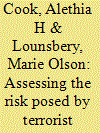

|
|
|
|
|
| Publication |
2011.
|
| Summary/Abstract |
While terrorist organizations have been analyzed for their motivations and tactics, little has been done to develop a systematic understanding of what makes some groups more dangerous than others. Knowing what makes some groups more threatening than others, or what conditions can influence a single group to become more or less of a threat, would help governments to prioritize resources during counterterrorism efforts. Using an approach similar to Ted Robert Gurr's assignment of a risk score to identify impending minority group rebellion, this article develops and tests a set of terrorist organizational characteristics. A two-phased approach is used. First, the authors identify key characteristics that could be anticipated to drive groups to be more active or deadly. The characteristics were identified and measured for terrorist groups for 1990-1994. The authors test group characteristics against subsequent group violence intensity from 1995 to 1999. Findings indicate that some group characteristics, such as religious ideology and group size, are important to understanding a group's relative level of violence. Though the study focused on a relatively short period of time, the findings indicate that a more comprehensive study of the impact that group characteristics have on violence levels would be a worthwhile undertaking.
|
|
|
|
|
|
|
|
|
|
|
|
|
|
|
|
| 2 |
ID:
109142
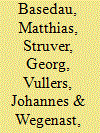

|
|
|
|
|
| Publication |
2011.
|
| Summary/Abstract |
Theoretically, the "mobilization hypothesis" establishes a link between religion and conflict by arguing that particular religious structures are prone to mobilization; once politicized, escalation to violent conflict becomes more likely. Yet, despite the religious diversity in sub-Saharan Africa and the religious overtones in a number of African conflicts, this assumption has not yet been backed by systematic empirical research on the religion-conflict nexus in the region. The following questions thus remain: Do religious factors significantly impact the onset of (religious) armed conflict? If so, do they follow the logic of the mobilization hypothesis and, if so, in which way? To answer these questions, this article draws on a unique data inventory of all sub-Saharan countries for the period 1990-2008, particularly including data on mobilization-prone religious structures (e.g., demographic changes, parallel ethno-religious identities) as well as religious factors indicating actual politicization of religion (e.g., inter-religious tensions, religious discrimination, incitement by religious leaders). Logit regressions suggest that religion indeed plays a significant role in African armed conflicts. These findings are compatible with the mobilization hypothesis, and stress the impact of conflict-prone religious structures, and particularly, the fact that overlaps of religious and ethnic identities are conflict-prone. Future research should investigate the religion-ethnicity-nexus in more detail.
|
|
|
|
|
|
|
|
|
|
|
|
|
|
|
|
| 3 |
ID:
109143
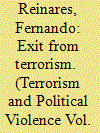

|
|
|
|
|
| Publication |
2011.
|
| Summary/Abstract |
Terrorists disengage from the groups or organizations to which they belong as a result of structural, organizational, or personal factors. These types of factors seem to operate with relative mutual independence. All this can be analytically induced from research conducted at an individual level of analysis, based on 35 long interviews with former members of ETA who voluntarily decided to conclude their militancy at some point between 1970 and 2000. Until the mid-1980s, the individual decision to leave ETA tended to be linked to a subjective perception of ongoing political and social changes. From then on, disagreement with the internal functioning of the ethno-nationalist terrorist organization or the tactics adopted by its leaders became more salient motivations for those militants who decided to walk away. All along, however, there were ETA members who left terrorism behind for reasons of a rather personal nature. As expected, in this qualitative empirical study, disengagement was found to be a process seldom concomitant to that of deradicalization.
|
|
|
|
|
|
|
|
|
|
|
|
|
|
|
|
| 4 |
ID:
109141


|
|
|
|
|
| Publication |
2011.
|
| Summary/Abstract |
My aim in this article is to extend Marc Sageman's seminal research on Al Qaeda by re-articulating it through the prism of Albert Cohen's theory of delinquent subcultures, an approach which came to prominence in Criminology in the 1960s, but has since then been largely eclipsed by other approaches in that field. Drawing on Sageman's findings and observations, I suggest that Al Qaeda-affiliated or -inspired groups in the West can be best understood as a collective response or "solution" to the strains encountered by the members of these groups, and that these strains are imposed on them by the circumstances in which they find themselves. My broader aim is to show that although Criminology, with a few exceptions, ignores the subject of terrorism, terrorism studies can appreciably benefit from an engagement with Criminology as a source of theoretical inspiration.
|
|
|
|
|
|
|
|
|
|
|
|
|
|
|
|
| 5 |
ID:
109139
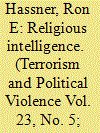

|
|
|
|
|
| Publication |
2011.
|
| Summary/Abstract |
Sacred rituals and symbols can act as force multipliers that motivate and constrain the effectiveness of actors. Religious intelligence involves an assessment of how these rituals and symbols affect combat operations. The fourfold challenge faced by the religious intelligence analysts is to ascertain how prominent a role religion will play in a given conflict, what the relevant sacred phenomena are, how salient they are for the specific religious communities present, and how they will affect a given conflict. The case studies that form the core of this article highlight three issue areas open to religious intelligence collection and analysis, and exhibit variation in the ability of intelligence analysts to correctly assess those religious factors. Egyptian and Israeli decision making prior to the 1973 Arab-Israeli War illustrates how information about sacred time can influence war initiation. The diverging outcomes of two counterinsurgency operations at the same sacred site, "Operation Blue Star" (1984) and "Operation Black Thunder" (1988), demonstrate the utility of intelligence about the parameters of sacred space. A final case study explores the U.S. failure to grasp the importance of religious authority in the Iranian Revolution. I conclude by considering the actors best suited for gathering and processing religious intelligence. Religious intelligence requires interdisciplinary teams that combine expertise in religion, area studies, and military operations.
|
|
|
|
|
|
|
|
|
|
|
|
|
|
|
|
| 6 |
ID:
109144
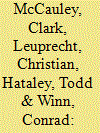

|
|
|
|
|
| Publication |
2011.
|
| Summary/Abstract |
A 2008 poll of 430 Ottawa Muslims found predominantly negative views of the U.S. war on terrorism, including the war in Iraq and the war in Afghanistan. This poll also assessed approval of Western powers (U.S., Canada, Israel, United Nations) and challengers of Western power (Al-Qaeda, Hamas, Hizballah, government of Iran). Surprisingly, attitudes of Ottawa Muslims toward militant Muslim groups were unrelated to their attitudes toward Western governments. Discussion suggests that this pattern, if confirmed in other Muslim polls, would mean that the war of ideas against radical Islam must address not one target but two: favorable opinions of militants and unfavorable opinions of the U.S. Muslims who come to like the West more may not like Muslim militants any less.
|
|
|
|
|
|
|
|
|
|
|
|
|
|
|
|
|
|
|
|
|